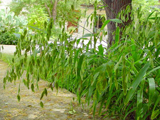Native Plants

Q. Who is Mr. Smarty Plants?
A: There are those who suspect Wildflower Center volunteers are the culpable and capable culprits. Yet, others think staff members play some, albeit small, role. You can torture us with your plant questions, but we will never reveal the Green Guru's secret identity.
Did you know you can access the Native Plant Information Network with your web-enabled smartphone?
Ask Mr. Smarty Plants is a free service provided by the staff and volunteers at the Lady Bird Johnson Wildflower Center.

rate this answer
Tuesday - April 09, 2013
From: Pittsburgh, PA
Region: Mid-Atlantic
Topic: Wildlife Gardens, Deer Resistant, Shade Tolerant, Grasses or Grass-like
Title: Plant for deep shade in Pennsylvania
Answered by: Nan Hampton
QUESTION:
Hi! I am landscaping our house and trying to use only plants that provide seasonal benefit to bees, butterflies, birds etc. not the deer though. My question is that I have a fairly steep slope of about 2000 square feet where garlic mustard and other undesired plants are growing in shade/dense shade. I need a plant(s) that can establish and spread aggressively in this spot and hopefully benefits the wildlife. Thank you!ANSWER:
Grasses and sedges are rarely eaten by deer, but their seeds are eaten by birds and other wildlife. Unfortunately, many grasses don't grow well in the shade; however, below are some that will grow in the shade. Grasses and sedges are your best bet to compete with the garlic mustard. The herbaceous plants can be interspersed with the grasses to add color and variety for the birds and butterflies. All the herbaceous plants listed below are found in the Deer Resistant Species list, will grow in the shade and are native to Pennsylvania. If you would like to see other possibilites for herbaceous plants for Pennsylvania, you can use the NARROW YOUR SEARCH option on the Deer Resistant Species list and choose "Pennsylvania" from Select State or Province, "Herb" from General Appearance and "Shade" from Light Requirement.
Grasses and Sedges
Chasmanthium latifolium (Inland sea oats)
Muhlenbergia schreberi (Nimblewill)
Sorghastrum nutans (Indiangrass)
Carex blanda (Eastern woodland sedge) is evergreen.
Carex plantaginea (Plantainleaf sedge) is evergreen.
Carex pensylvanica (Pennsylvania sedge) is evergreen.
Herbaceous Plants
Aquilegia canadensis (Eastern red columbine)
Eutrochium purpureum (Purple joepyeweed)
Capsicum annuum (Chile pequin)
Rudbeckia hirta (Black-eyed susan)
Verbesina virginica (Frostweed)
Even though the plants listed above will compete with garlic mustard (and other unwanted plants), you are going to have to be aggressive in getting rid of it. Here is a link to an article about Alliaria petiolata (Garlic mustard) from the Plant Conservation Alliance's Alien Plant Working Group with a section on how to manage it.
From the Image Gallery
More Grasses or Grass-like Questions
Brown spots in St. Augustine grass
July 05, 2008 - Mr. Smarty Plants, My husband and I are in the Air Force and were recently moved to Cibolo Texas. We built a home and hired a landscaper to finish the yard May 07 (with irrigation system). We laid d...
view the full question and answer
Muhlenbergia dumosa safe for horses from Austin
May 13, 2014 - Is Muhlenbergia dumosa safe for horses? Will horses eat it? I have a client who has a mini-horse who visits her property on occasion, and I want to ensure that what I plant is both safe for the hors...
view the full question and answer
Source for Saltmarsh cordgrass from Houston
April 16, 2013 - I work for a consulting firm and we are looking to do more of our wetland creation/restoration. Do you know where one can purchased Spartina alterniflora?
view the full question and answer
Short or mowable plant for walkway
June 03, 2008 - I'd like a short and/or mowable plant to use as a walkway in and around a vegetable garden in upstate NY. I was planning on clover, but I want to use a native plant if possible. The native clovers ...
view the full question and answer
Frequency of mowing on native grasses
November 17, 2006 - I live on 5 acres in TX Hill Country. I love the native grasses when they are high and blowing, etc. My husband insists on mowing, claiming that by mowing, the grasses grow more rapidly over the dry...
view the full question and answer
| Support the Wildflower Center by Donating Online or Becoming a Member today. |

